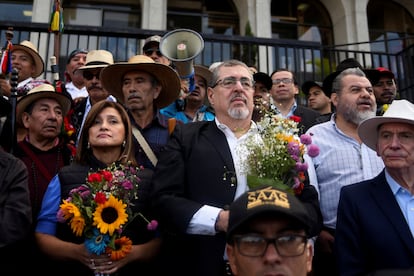The coup d’état led by the attorney general in Guatemala will fail
Day after day, despite the prevailing uncertainty due to the public prosecutor’s onslaught, the army of civilians defending the putschist effort has more and more silent deserters

In places like Guatemala, coups are still the operational monopoly of the army, of course, with the backing of the oligarchy and a wink from the U.S. empire. The only time a civilian tried it, just over 30 years ago, it failed. Jorge Serrano, being a democratically elected president, suffered a hallucination of massive popular support and dissolved Congress and the courts of justice, but the armed forces were fragmented and the oligarchy was decidedly adverse to him. They were fighting among themselves for the benefits of the juicy privatizations of state enterprises. Washington, moreover, had learned from the successful coup of Alberto Fujimori that had taken place a year earlier in Peru. The Guatemalan Constitutional Court then ruled against the attempted coup, and the defeated president resigned himself to the silver bridge to Panama, where he still lives.
Attorney General Consuelo Porras — the Torquemada of Guatemala — is the second civilian to attempt a coup d’état, dubbed “coup in slow motion,” as it has been going on for almost six months of laborious and exhausting judicial skirmishes. What is unprecedented in the case is that the coup is against a legitimately elected government and a president elected by 61% of the voters, Bernardo Arévalo, but who has not yet been sworn in — the swearing-in is scheduled for January 14. Since 2019, Porras has served as the spearhead of the Pact of the Corrupt, a loose coalition of politicians, bureaucratic and business elites, plus powerful drug trafficking groups, which has pushed back civil and political liberties, unleashing fierce persecution against dissent, particularly against independent justice operators, who now number half a hundred in exile.
This time, the prosecutor launched an irrational attack against president-elect Bernardo Arévalo and several leaders of his party, Movimiento Semilla. She intends to erase them from political existence and describes them as a “criminal organization.” For the time being, she managed to freeze the legal status of the party, issued arrest warrants against some of its youth leaders and has launched three lawsuits against Arévalo to imprison him. She has the underhanded support of President Alejandro Giammattei, who is urged on by his unofficial partner, the young Miguel Martinez, sanctioned at the beginning of December by the Biden administration with the Magnitsky Act for alleged acts of corruption in the purchase of Russian vaccines and money laundering in a U.S. bank. The coup effort is supported by a majority of deputies — provided they get their money’s worth —, some judges and magistrates, and oligarchs who still believe they are anonymous.
But that army of civilians contains many people who speculate about which side to jump to and, day after day, despite the prevailing uncertainty due to the prosecutor’s onslaught, there are more silent deserters. In the courts, they have lost the majority for major decisions. In the Attorney General’s Office, there are more and more employees who carry out illegal assignments by dragging their feet. The next Congress, which is due to take office on January 14, is already fragmented: Giammattei’s party contains four currents; that of Sandra Torres — the defeated candidate, but second legislative force — is divided into three; Cabal, the organization founded by former candidate Edmond Mulet, is broken, and so on. The military officers, warned by the U.S. Southern Command, remain on the sidelines of the political fights, except for a handful of members of the Giammattei and Miguel Martinez clique, who can be counted on the fingers of one hand. The radical oligarchy is under surveillance. Some of them have already received the notice that they cannot visit Mickey Mouse again and their assets have been frozen, but there are several behind the scenes who believe that they have outwitted the empire while they continue to fund the coup plotters.
Last Friday, the Prosecutor’s Office presented a plea criminalizing Arévalo and the Semilla party, and went all out: it demanded the annulment of the elections of June 25 and August 20. Its arguments have been copiously discredited by local and international experts. It seems that the lieutenants of the prosecutor Consuelo Porras were dressed with kamikaze vests, precisely on the day when she had to appear before the press and the rumors of her alleged illnesses increased on social media. However, the unplanned pincer of mobilized Indigenous peoples and the international community continue to operate in defense of democracy.
Sign up for our weekly newsletter to get more English-language news coverage from EL PAÍS USA Edition
Tu suscripción se está usando en otro dispositivo
¿Quieres añadir otro usuario a tu suscripción?
Si continúas leyendo en este dispositivo, no se podrá leer en el otro.
FlechaTu suscripción se está usando en otro dispositivo y solo puedes acceder a EL PAÍS desde un dispositivo a la vez.
Si quieres compartir tu cuenta, cambia tu suscripción a la modalidad Premium, así podrás añadir otro usuario. Cada uno accederá con su propia cuenta de email, lo que os permitirá personalizar vuestra experiencia en EL PAÍS.
¿Tienes una suscripción de empresa? Accede aquí para contratar más cuentas.
En el caso de no saber quién está usando tu cuenta, te recomendamos cambiar tu contraseña aquí.
Si decides continuar compartiendo tu cuenta, este mensaje se mostrará en tu dispositivo y en el de la otra persona que está usando tu cuenta de forma indefinida, afectando a tu experiencia de lectura. Puedes consultar aquí los términos y condiciones de la suscripción digital.








































